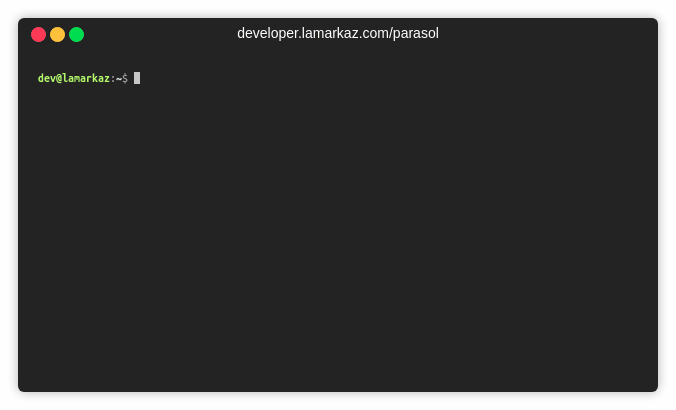Agile Smart Contract Development Environment

- First-ever Solidity Preprocessor & macros
- Instant zero-configuration contract deployments using INFURA
- Async-REPL Javascript session to interact with deployed contracts & web3
- Integrated Markdown contract documentation using Natspec + ABI
- Standalone and inline Mocha unit tests
- Auto-recompiling, tests & documentation on file change
- Unlimited customizability, exposure of all dependency configs
- Unopinionated design, low design pattern restrictions
sudo npm i -g parasol-cli
parasol --help for list of commands
parasol init
parasol
Parasol full documentation is available for both beginner and advanced users at the Lamarkaz Developer Portal
The development environment will automatically spawn a REPL Javascript interative session on startup. The new session allows you to interact synchronously with your deployed contracts and the web3 instance. It also allows you access to a set of handy global variables.
In order to print the list of available global variables and commands just type .help in the interactive shell.
A nice feature of the Parasol session is that it automatically handles Promises synchronously. This makes life easier when interacting with contracts and web3.
INFURA.io is the default node endpoint for Parasol deployments on all supported networks. The available networks are: mainnet, ropsten, kovan, rinkeby and infuranet
- Create a
secrets.jsonfile in your project directory containing an array of at least one private key with sufficient balance to deploy contracts.["YOURPRIVATEKEY"]Don't worry, this file is.gitignored on the repo. It will never be exposed using Git. - Select your network of choice and run the following command:
parasol deploy [network]where[network]is a network from the list above. If you only runparasol deploy, the contracts will be deployed to the mainnet by default. - To interact with your live contracts using the interactive Javascript session, simply type:
parasol interact [network]where[network]is a network from the list above. The default network ismainnet.
All Javascript mocha unit tests must be inside the tests directory in order to run. The tests are automatically run on parasol and are rerun on file changes in the tests, Solidity contracts or the parasol.js config file. Alternatively, you may run tests manually using parasol test. Unit tests in Parasol have no restrictions on file names or location inside the tests folder; they are disconnected from smart contract names and file names.
We developed Psol, the first ever Solidity lexical preprocessor, in order to enhance smart contract development in ways that were never possible before. The possibilities include Vue-style single file components, inline code-describing unit tests, precompilation macro substitution, conditional compilation, remote dependency auto-fetching and many others. Because Parasol is about freedom, the usage of the preprocessor is completely optional. Only files that end with the .psol extension in the contracts/ directory will be preprocessed. Parasol provides a number of variables by default to the preprocessor context, including the web3 instance, the accounts array, a test() function and others.
Just running the parasol command, or in addition to any of the dev, deploy and test arguments will automatically generate a single README.md markdown file in the docs/ directory containing Natspec Devdoc and ABI documentation for all compiled contracts. Additionally, while actively running the parasol command, the documentation file will be regenerated on every change.
Most existing development environments are designed for dApps, not for smart contracts. Developers are restricted to the Migration smart contracts design pattern as required by other development environments to facilitate dApp versioning. Parasol puts into consideration developers who intend to develop pure smart contracts and avoids restricting them to a specific dApp design pattern.
Parasol aims to implement as little abstraction on top of its dependencies as possible. It provides direct configuration access to its core components such as solc and ganache. Additionally, it allows the user the freedom to customize and contract deployment logic through the deployer() function in the configuration file.
Agile development is important for the entire smart contract development cycle, not only for the Solidity contracts themselves. In the realm of Solidity, unit tests can end up taking substantially longer to perfect than their source contracts. Hence, they consume more time. And then comes, documentation. In Parasol's development environment, any changes made to unit tests, smart contract source code or any js/json file will immediately and quickly recompile all code, run static analysis, redeploy on ganache, recompile documentation and rerun unit tests.
- Dcourt dispute resolution integration
- Parasol Decentralized Package Manager
- Solidity style & security linting and auto-fixing using Solium.
We actively review issues and pull requests. Learn how to contribute.